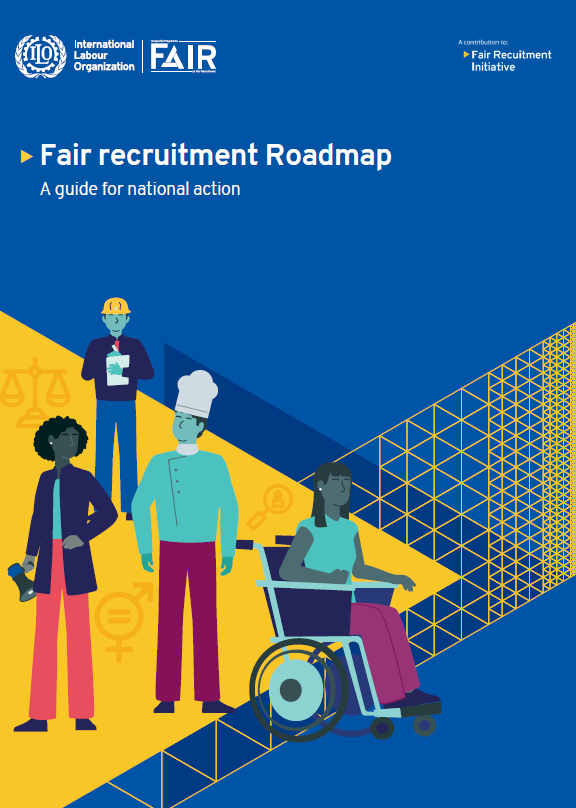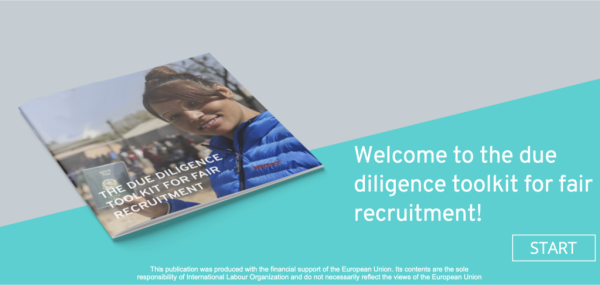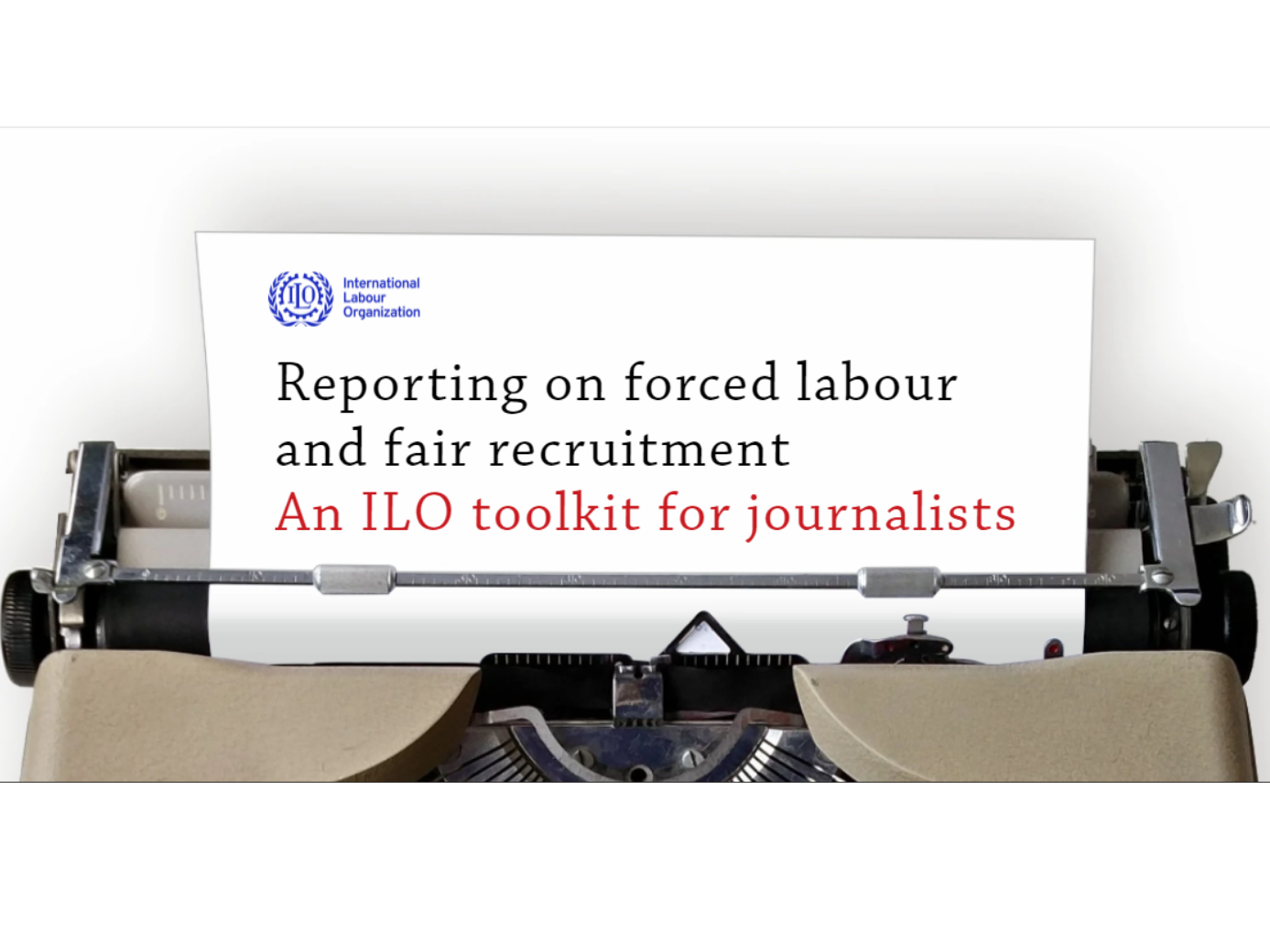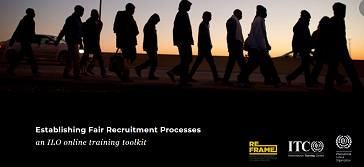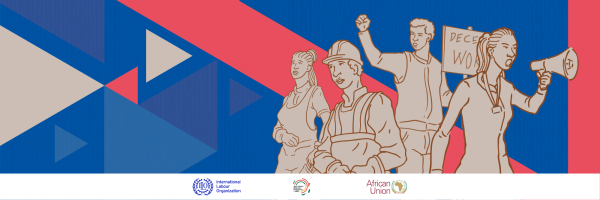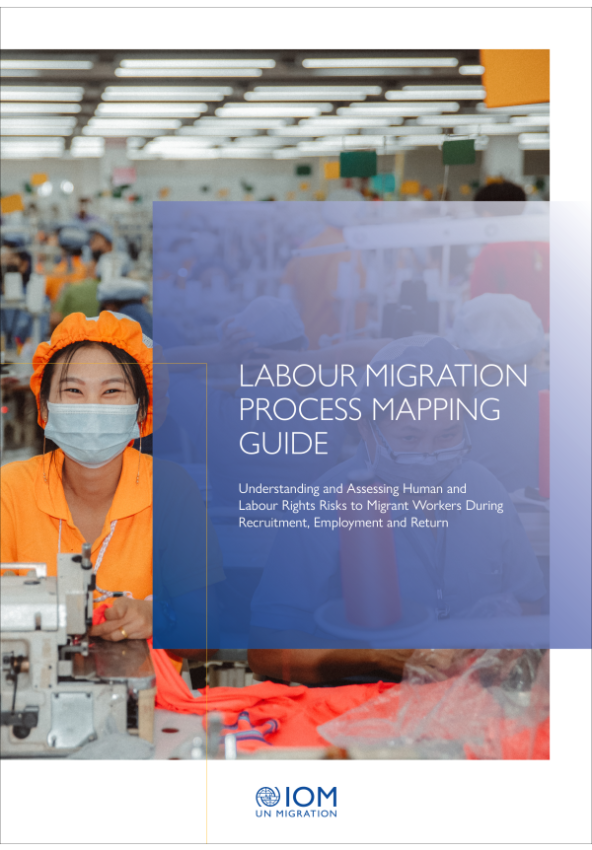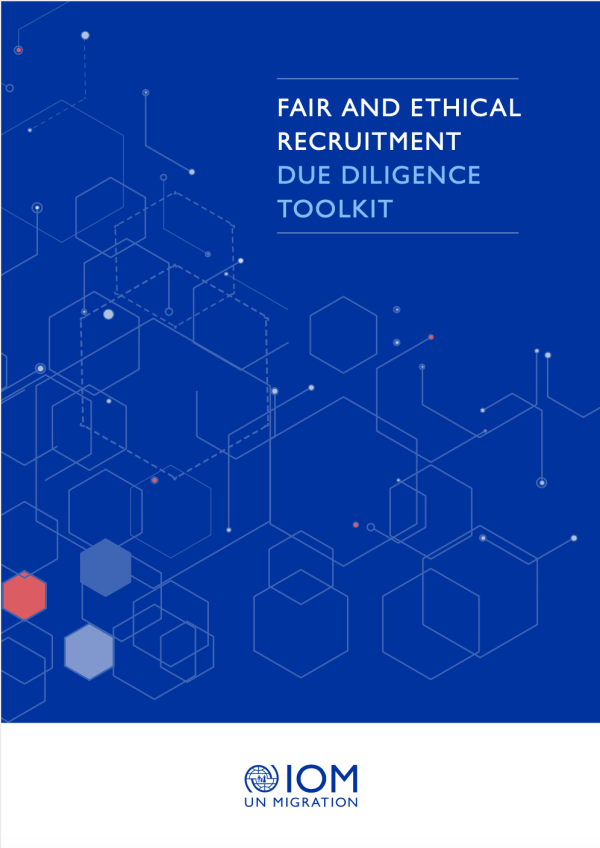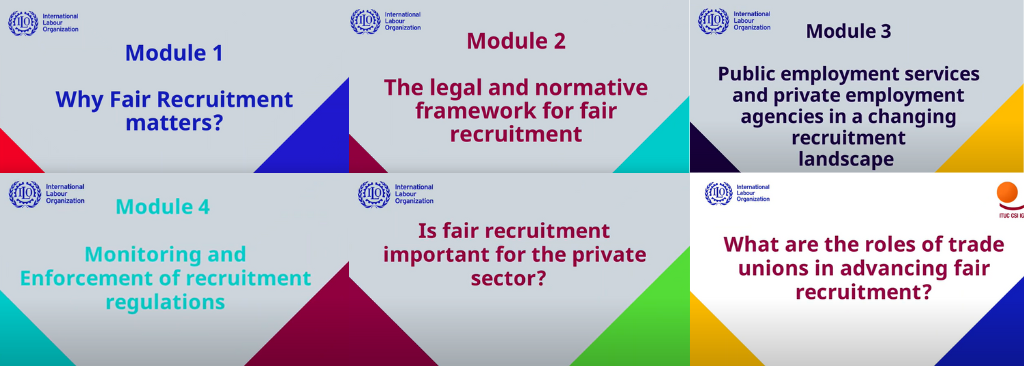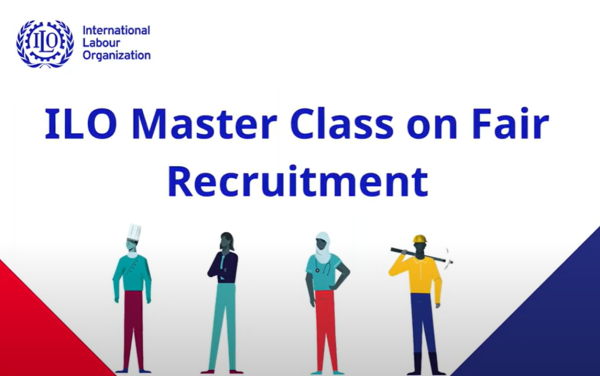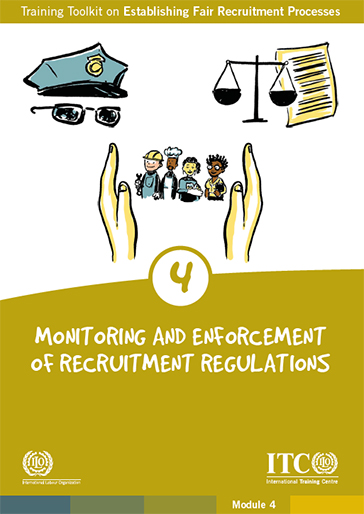Fair recruitment Roadmap: A guide for national action
This roadmap is a practical step-by-step guide to assist national policymakers and recruitment stakeholders, including governments and social partners, in effectively implementing fair recruitment at the national level.
Type of document :
Country/Region :
Year of publication :
Theme : , , , , , ,
Due diligence toolkit for fair recruitment
The fair recruitment toolkit developed by the Global Business Network on Forced Labour helps businesses, especially SMEs (small- and medium-sized enterprises), to set out a due diligence process when hiring workers from abroad. It features step-by-step guidance for companies throughout the recruitment process.
The toolkit has now been translated into French and Spanish.
In English En français En español
The toolkit helps businesses answer the following questions:
- Do you have an approach to, or policy on, fair recruitment?
- Can you identify the main risks?
- Do you have an action plan to manage and reduce risks?
- How do you track progress?
- Can you address problems and complaints?
The toolkit has an additional section on the impact of the COVID-19 pandemic on recruitment, and points businesses towards useful additional resources.
Type of document :
Country/Region :
Year of publication :
Theme : , ,
Reporting on forced labour and fair recruitment: An ILO toolkit for journalists
This toolkit provides information and advice to media professionals on how to report accurately and effectively on forced labour and fair recruitment. The toolkit includes the Media-friendly glossary on migration.
This toolkit is available in: Arabic, English, French, Spanish.
The toolkit has been adapted to the national context in:
-
Nepal (English)
-
Nigeria (forthcoming)
-
Pakistan (English)
- Uganda (forthcoming)
-
Viet Nam (English, Vietnamese).
Click on each language to open the corresponding toolkit.
Type of document :
Country/Region : , , , , , , ,
Year of publication :
Theme : , ,
Establishing Fair Recruitment Processes: An ILO online training toolkit
In cooperation with ITC-ILO, the REFRAME project has produced a comprehensive modular training manual on fair recruitment to support its constituents to design, support and implement fair recruitment practices.
This training course is available as an interactive version (online) and as individual downloadable modules (PDF). It contains five modules covering different aspects of fair recruitment. This training manual is available in English, French, Spanish and Arabic.
Type of document :
Country/Region :
Year of publication :
Theme : , ,
ITC-ILO Online Course: Trade Union Manual to Promote Migrant Workers’ Rights and Foster Fair Labour Migration Governance
Introduction to the course
International migration has been on the rise within Africa. In 2019, there were 26.3 million international migrants in Africa - an increase of 17.2 million since 2010. Movement across national borders in search of decent work is one of the key drivers of international migration. Throughout the migration and recruitment process, migrant workers are exposed to undue hardships and abuses in the form of low wages, poor working and living conditions, limited access to social protection, denial of freedom of association and workers’ rights, discrimination as well as social exclusion. Migrant workers’ contributions to the economies of their host and origin countries many times remains unaccounted for – yet migrant workers generate tremendous benefits to both.
In this context, there is a need therefore for a comprehensive and balanced approach to labour migration governance. Well-governed labour migration can contribute to sustainable development for countries of origin, transit and destination, and can provide benefits and opportunities for migrant workers and their families. In this regard, the ILO in collaboration with the Joint Labour Migration Programme (JLMP) and the African Union (AU), developed the Trade Union Manual to promote migrant workers’ rights and foster fair labour migration governance in Africa intended to achieve this objective. The self-guided toolkit complements the ILO training programmes and capacity building activities for Trade Unions aiming at strengthening their role in promoting a rights-based approach to labour migration.
Who attends this course?
The course is designed for officials, policy-makers and practitioners of public institutions and ministries dealing with migration, trafficking and/or forced labour; representatives of employers' and workers’ organizations; representatives of public and private employment agencies; staff of NGOs and civil society organizations; experts from international agencies and other key actors concerned with these issues.
Objectives of the toolkit
Participants will learn about:
- Regional policy, legal frameworks and programmes on labour migration
governance in Africa - International instruments and international labour standards relevant to migrant workers
- The importance of social dialogue in labour migration governance
- Trade union initiatives to promote fair recruitment, and gender-responsive policy implementation
- The role of trade unions in Africa and abroad and recommendations in terms of providing support to migrant workers
- Trade union international good practices
Methodology and certification
The course consists of a number of online modules offered via the ITCILO e-Campus online platform-
This course provides a flexible learning journey as it is completely asynchronous, composed of several self-guided modules.
At the end of course and after successfully completing the final quiz, participants will be granted a certificate of participation.
Structure
The toolkit is composed of 14 training modules, each module has examples of international good practices and highlights the role that workers’ organizations play in each thematic area.
Download the PDF version of Trade Union Manual to Promote Migrant Workers' Rights and Foster Fair Labour Migration Governance
Module 1.
ILO’s Mandate, AU on Labour Migration, Tripartism and Social Dialogue, Data and Trade Union Networks in Africa on Labour Migration
Module 2.
Global Policy Frameworks guiding labour migration governance in Africa
Module 3.
Global Instruments on the protection of migrant workers (UN and ILO Instruments)
Module 4.
Regional policy, legal frameworks and programmes on labour migration governance in Africa
Module 5
Gender equality and women’s empowerment in labour migration governance
Module 6.
Women migrant domestic workers’ particular challenges in working in private households. The need for targeted TU actions
Module 7.
Enhancing fair recruitment practices and regulations
Module 8
Labour exploitation and abuse of migrant workers
Module 9
Skills partnerships, migrant workers’ skills development, portability and recognition, certifications of skills and qualifications
Module 10.
Organizing migrant workers: Freedom of Association and Collective Bargaining, key obstacles and good practices
Module 11.
Promoting social protection of migrant workers
Module 12.
Working and living conditions of migrant workers particularly working time, wages, occupational safety and health, violence and harassment, HIV/AIDS
Module 13.
Advocating for equality of treatment and opportunities, and contributing to labour market integration and combating discrimination in diverse multi-ethnic workplaces and multilingual contexts
Module 14.
Impact of COVID-19 on labour migration
Start the course here.
Type of document :
Country/Region :
Year of publication :
Theme : ,
Trade Unions Manual to Promote Migrant Workers’ Rights and Foster Fair Labour Migration Governance in Africa
International migration has been on the rise within Africa. In 2019, there were 26.3 million international migrants in Africa - an increase of 17.2 million since 2010. Movement across national borders in search of decent work is one of the key drivers of international migration. Throughout the migration and recruitment process, migrant workers are exposed to undue hardships and abuses in the form of low wages, poor working and living conditions, limited access to social protection, denial of freedom of association and workers’ rights, discrimination as well as social exclusion. Migrant workers’ contributions to the economies of their host and origin countries many times remains unaccounted for – yet migrant workers generate tremendous benefits to both.
In this context, there is a need therefore for a comprehensive and balanced approach to labour migration governance. Well-governed labour migration can contribute to sustainable development for countries of origin, transit and destination, and can provide benefits and opportunities for migrant workers and their families. In this regard, the ILO in collaboration with the Joint Labour Migration Programme (JLMP) and the African Union (AU), developed the Trade Union Manual to promote migrant workers’ rights and foster fair labour migration governance in Africa intended to achieve this objective.
The toolkit is composed of 14 training modules, each module has examples of international good practices and highlights the role that workers’ organizations play in each thematic area.
Type of document :
Country/Region :
Year of publication :
Theme : ,
Labour Migration Process Mapping Guide: Understanding and Assessing Human and Labour Rights Risks to Migrant Workers During Recruitment, Employment and Return
The Labour Migration Process Mapping Guide aims to help business enterprises identify, mitigate, and address human and labour rights risks faced by migrant workers in global supply chains. It provides step-by-step instructions on how to retrace the steps that migrant workers take from their communities of origin to their workplaces in destinations, and determine the effectiveness of existing recruitment management systems to prevent and address forced labour risks.
Designed primarily for business enterprises with complex international supply chains where migrant workers are present, the Guide builds on the United Nations Guiding Principles on Business and Human Rights (UNGP) and relevant international human rights, labour standards and frameworks on responsible business conduct.
Notably, the Guide was a collaborative effort developed in consultation with governments, civil society, migrant workers and the private sector, as well as by the collection of good practices by employers, multinational enterprises and labour recruiters.
Three supporting tools, which include effective interview techniques and key considerations to ensure migrant worker safety and well-being, are also attached in the Guide. They are:
- Migrant Worker Interview Tool
- Employer Management Interview Tool
- Labour Recruiter Management Interview Tool
Type of document :
Country/Region :
Year of publication :
Theme : ,
Fair and Ethical Recruitment Due Diligence Toolkit by IOM
The International Organization for Migration (IOM) Fair and Ethical Recruitment Due Diligence Toolkit was developed to support business enterprises in fulfilling their responsibility to respect human rights in the context of international recruitment. It provides practical tools that enterprises can use to conduct comprehensive due diligence in line with the UN Guiding Principles on Business and Human Rights (UNGPs), the OECD Due Diligence Guidance for Responsible Business Practice, and IOM’s Migrant Worker Guidelines (MWGs). It can be used by enterprises to develop or strengthen due diligence processes in directly recruiting and managing business relationships with labour recruiters and private employment agencies that place migrant workers.
The tools within the Toolkit contain detailed guidelines and practical recommendations on how the due diligence processes described in the UNGPs and MWGs can be operationalized. The tools include interactive features that will direct users to the next due diligence process or the corresponding actions that are recommended for them to take. Enterprises may directly use or edit the tools to adapt to the unique nature of their operations and business relationships.
Tools to operationalize fair and ethical recruitment due diligence:
- 1. Embedding fair and ethical recruitment principles into policies and management systems
- 2. Identifying and assessing adverse human and labour rights impacts on migrant workers
- 3. Preventing and mitigating adverse human and labour rights impacts on migrant workers
- Corrective Action Plan Template (linked to the Self-assessment Checklist)
- Training Management Tool
- Pre-departure Orientation Checklist
- Post-arrival Orientation Template
- 4. Tracking implementation and results
- 5. Communicating how adverse impacts are addressed
- 6. Providing access to remedy
Access the full Toolkit here.
For questions, please email iom.dd.support@iom.int.
Type of document :
Country/Region :
Year of publication :
Theme : , , ,
Master class on fair recruitment
Within the context of exacerbated challenges created by COVID 19 pandemic, the ILO’s General Principles and Operational Guidelines for Fair Recruitment and Definition of Recruitment Fees and Related Costs (GP&OG) provides invaluable guidance on how to ensure the recruitment process of workers, especially migrant workers. The GP&OG are organized in a way that respects the rights of those involved, the needs of communities of origin and destination, and takes into account the legitimate needs of employers and recruiters.
Based on the ILO Fair Recruitment Initiative Strategy, the ILO and ITC-ILO have developed a series of Master class on fair recruitment, to explain what can be done to reduce the risk of abusive and fraudulent recruitment of workers. The Masterclass on fair recruitment is divided into six modules:
Type of document :
Country/Region :
Year of publication :
Theme :
ITC-ILO training: Monitoring and enforcement of recruitment regulations - Establishing Fair Recruitment Processes
By the end of this module, participants will be able to:
- Understand governments’ responsibilities in regards to the monitoring and enforcement of recruitment regulations
- Have an introductory knowledge of the use of monitoring as an enforcement mechanism and its contribution to ensuring the fair recruitment of workers
- Recognize the key challenges associated with complaints mechanisms and access to justice for workers, including migrant workers
- Explore the most commonly used legislative mechanisms for prosecuting recruitment abuses
- Appreciate the particular role of trade unions and non-governmental organizations in promoting and monitoring fair recruitment
- Become familiar with pilot initiatives of workers’ organizations to protect and empower workers during the recruitment and placement process
- Become acquainted with self-regulation mechanisms adopted by private recruitment agencies
Type of document :
Country/Region :
Year of publication :
Theme : ,
Subscribe to the Fair Recruitment Initiative Newsletter
Sign up to receive news delivered to your inbox.

